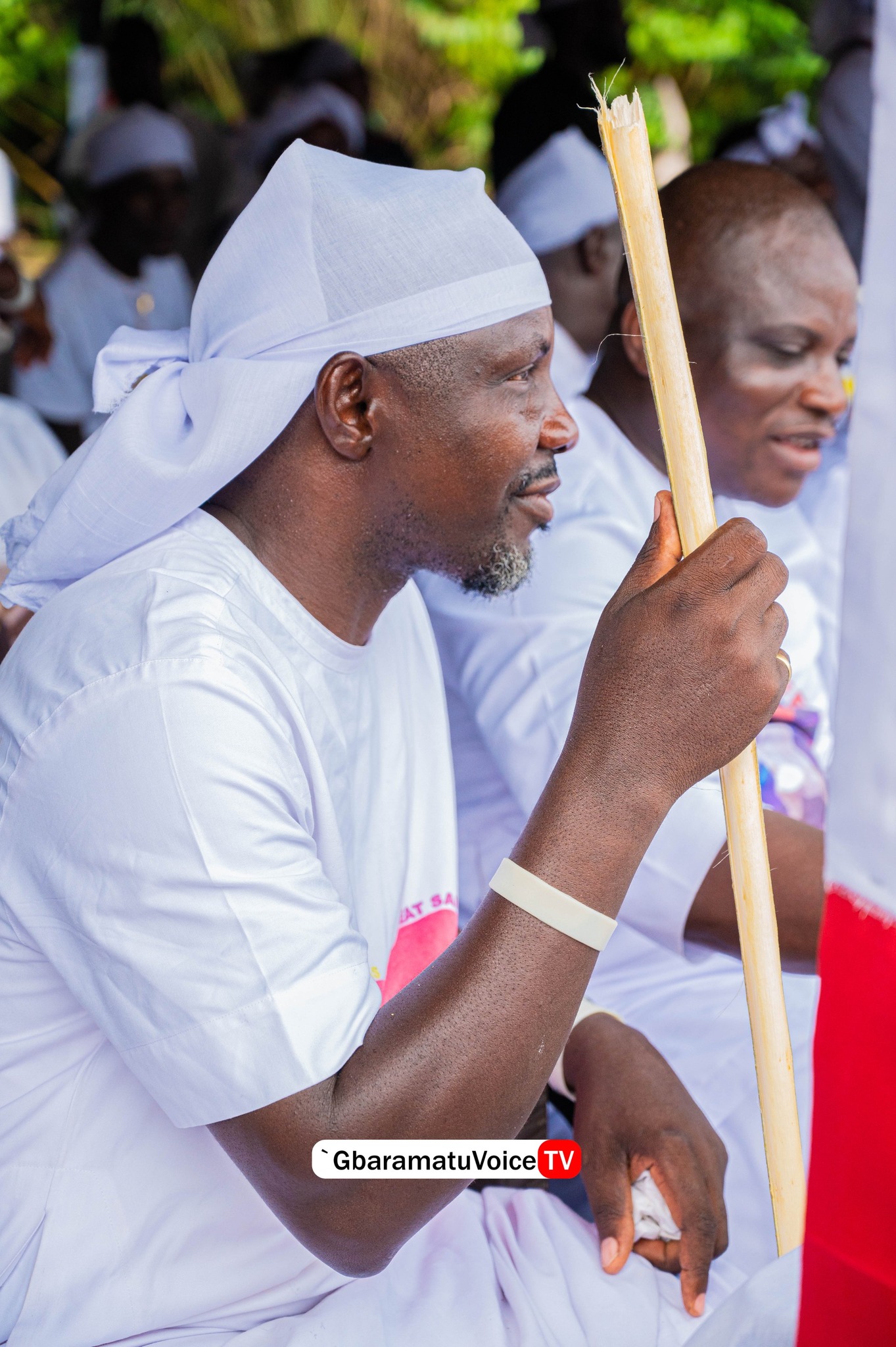Tompolo, EFCC, and the Sacred Creeks: A High-Stakes Confrontation Unfolds
The Economic and Financial Crimes Commission (EFCC), Nigeria’s foremost anti-corruption agency, currently faces a monumental dilemma: what to do about the allegations that High Chief Government Ekpemupolo, popularly known as Tompolo, desecrated the Naira by allegedly stepping on it during a cultural event in the creeks of the Niger Delta. It seems like a simple matter of enforcing the law—after all, defacing the national currency is a punishable offense. But in Nigeria, especially in the Niger Delta, nothing is ever truly simple.
From their social media engagements and public statements, the EFCC has reiterated that no one is above the law and that Tompolo has a case to answer. But anyone who understands the landscape of Nigeria’s power dynamics, especially in relation to the militant history and cult-like reverence of Tompolo, knows that this is not just a legal issue—it is a political, spiritual, and cultural quagmire.”
One can only imagine the strategic meetings happening behind closed doors at the EFCC headquarters. How do you serve an arrest warrant to someone considered a living deity? How do you travel five hours by boat into the treacherous creeks of Gbaramatu to confront a man who commands the loyalty of hundreds of ex-militants and locals, and who is revered as the earthly representative of a water goddess?
Even more chilling is the real fear among EFCC officials that they might be walking into a trap. “Are Nigerians trying to set us up with this Tompolo matter?” a senior source reportedly asked. The anxiety is palpable. There are whispers that the officials selected for this mission might just disappear quietly through the Seme border before the day of departure. And who could blame them?
This is not the first time the federal government has attempted to bring Tompolo to book. Under the administration of President Muhammadu Buhari, Tompolo was declared wanted in connection to financial crimes and oil bunkering. Despite the seriousness of those charges, the man eluded arrest for years. Not only did he remain free, but the same government that declared him wanted eventually awarded him a contract worth over ₦4.5 billion annually to secure the nation’s oil pipelines.
YOU MAY READ
Niger Delta Youth Threaten to Shut Down Oil Production Over Alleged Harassment of Akpabio
To say this was ironic would be an understatement. It was a glaring contradiction that speaks volumes about the complexity of Nigeria’s governance. How do you criminalize a man, then turn around and make him a partner in national security? That is the paradox of Tompolo. He is both a pariah and a hero, a fugitive and a state contractor.
Tompolo is not the first man to hold dominion over the creeks of the Niger Delta, but many argue he is the most influential. His contemporaries—Asari Dokubo of Okirika and Ateke Tom of Okochiri—were once feared warlords who terrorized and controlled their respective domains. Today, they still wield influence, but none has the mystical aura that surrounds Tompolo.
While Ateke Tom has embraced kingship and Asari Dokubo frequently engages in political commentary, Tompolo remains rooted in the spiritual and physical geography of his homeland. The Gbaramatu Kingdom sees him as a sacred figure, an embodiment of the water goddess. He doesn’t merely command respect; he inspires awe.
The alleged offense—stepping on Naira notes—took place during a cultural celebration believed to have spiritual significance. In many traditional settings in Nigeria, Naira notes are used in rituals, tossed in the air or laid on the ground as offerings to deities or as part of dance steps. To interpret such actions outside the cultural context could be seen as an overreach.
Nevertheless, Nigerian law prohibits defacing the Naira in any form. The question then becomes: Can a law rooted in secularism fairly adjudicate a situation that is deeply religious and cultural in nature? EFCC’s job is to enforce the law. But where the law collides with culture and spirituality, the road becomes murky.
Possible Scenarios and Consequences
- A Peaceful Resolution: The EFCC could opt for diplomacy—perhaps inviting Tompolo to Abuja for questioning, under tight security and with full media coverage to avoid any “disappearance.” But will Tompolo honor such an invitation?
- A Covert Arrest Attempt: Should the EFCC insist on physically going into the creeks, they risk a standoff that could escalate into violence. Tompolo’s boys are not mere bodyguards; they are battle-hardened ex-militants who see any action against him as an assault on their people and their deity.
- A Government-Backed Cover-up: Given Tompolo’s strategic importance in safeguarding oil pipelines—a task the federal government deems critical—the matter could quietly be swept under the carpet. After all, oil revenues are at stake.
- Public Trial and Media Storm: If EFCC proceeds and arrests Tompolo, the event will dominate headlines for weeks. It will provoke ethnic, political, and cultural debates, perhaps even unrest in the Niger Delta. The optics of arresting a regional hero would need to be managed very delicately.
This case forces a national conversation about selective justice, regional autonomy, and the sacred cows of Nigerian politics. It calls into question whether any Nigerian is truly above the law—or if some simply float beyond its reach due to influence, mysticism, and connections.
If EFCC succeeds in prosecuting Tompolo, it sets a precedent that no individual is untouchable. If they fail—or worse, retreat—it sends the message that strength and cult-like status can shield one from the rule of law. Either outcome will have ripple effects.
EFCC officials are not soldiers. They are lawyers, accountants, and investigators trained for boardrooms and courtrooms, not jungle warfare or midnight raids in the creeks. Expecting them to match the militancy and spiritual fortitude of Tompolo’s domain is a strategic misalignment. Even with Navy backup, the psychological burden alone is immense.
There’s also the looming fear of retaliation. An unsuccessful arrest attempt could trigger community backlash or even sabotage of oil facilities—a move that would cost Nigeria billions in lost revenue and damage international relations with oil companies.
Tompolo has yet to respond publicly to the allegations or EFCC’s posturing. His silence speaks volumes. For a man once chased to the ends of the earth and then brought back into the fold as a government contractor, he understands timing and influence. He may be waiting for the political winds to change—or perhaps for the gods to speak.
In the meantime, his people continue to protect him with the kind of fervor reserved for sacred beings. To them, the EFCC is not just a federal agency—it is an intruder in their spiritual domain.
The alleged Naira desecration incident is more than a legal infraction; it is a test of Nigeria’s resolve to apply its laws equally. It is also a test of cultural sensitivity, spiritual diplomacy, and political navigation. Whatever EFCC decides, they must proceed with caution.
One false move, one miscalculation, and they risk igniting a crisis that goes beyond money or politics. They would be challenging a deity’s earthly incarnation—and in Nigeria, such things are never taken lightly.
The world is watching. So are the gods of the creeks.
EFCC is currently considering what to do with Tompolo’s alleged stepping on the Naira notes which is against the law and how they can travel on top of a high sea for five good hours to go and arrest him.
EFCC has already made it clear in some of their tweets that nobody is above the law and that Tompolo has a case to answer.I won’t be surprised to realize that some officials of EFCC believe Nigerians are trying to set them up with this Tompolo issue. I hope the officials selected to go and arrest Tompolo will not eventually abscond and leave the country via Seme border.I mean, how do you go about searching for a living deity in the creeks of Niger Delta? What if his boys decided to arrest the boat carrying the EFCC officials and leave them drifting in the middle of high sea for three days without access to phone calls and internet?EFCC officials shouldnt forget that this is the same man Buhari’s government declared wanted and couldnt see him till he finished his eight year tenure and even gave him #4.5billiion yearly contract to provide protection to the oil pipelines in Delta.A lot of people has compared his invincibility to that of Asari Dokubo who reigned in the creeks of Okirika in Rivers state and that of Ateke Tom who held sway in the creeks of Okochiri in same Rivers state.Ateke Tom and Asari Dokubo were senior colleagues to Tompolo. But Tompolo shared the creeks of Gbaramatu with no one. In Delta state, he remained the lord of the creeks.What made Tompolo exceptional among the other militant leaders in the Niger Delta is that he is seen as the representative/chiefpriest of the water goddess. He is seen as a living deity among his people.Till today, Asari Dokubo, Ateke Tom and Government Ekpemukporo Tompolo are highly reverred in their respective domain in Niger Delta. But Asari Dokubo and Tompolo are closer to the highs and mighty in Nigeria than Ateke Tom who is a king in Okochiri kingdom. But when they were miIitants, Tompolo was deadIier in war fronts than others but Asari Dokubo is more outspoken than all others.







